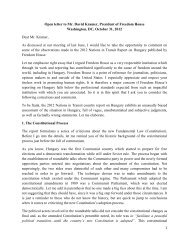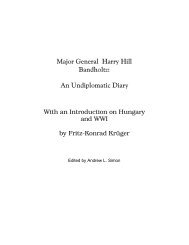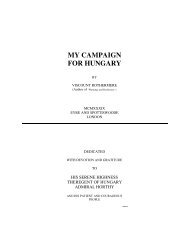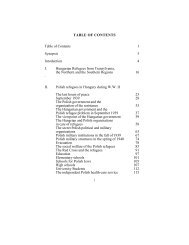The Fate of Western Hungary 1918-1921 - Corvinus Library ...
The Fate of Western Hungary 1918-1921 - Corvinus Library ...
The Fate of Western Hungary 1918-1921 - Corvinus Library ...
You also want an ePaper? Increase the reach of your titles
YUMPU automatically turns print PDFs into web optimized ePapers that Google loves.
Czech, Romanian and South Slav post <strong>of</strong>fices, and other foreign countries. Not<br />
so by the Royal Hungarian Mail, which only delivered the items after having<br />
charged a postal surcharge. 432 <strong>The</strong> rebels feared – with good reason – that if the<br />
stamps are printed in Budapest, the authorities will confiscate them. That was<br />
the reason for having had them printed in Vienna. News <strong>of</strong> this leaked out and<br />
the Austrian government confiscated the printed supply. <strong>The</strong> Paulussen Press<br />
was only able to deliver stamps after the October 13 signing <strong>of</strong> the Venice<br />
Protocol, even though the stamps were ready two days before. 433<br />
In the meanwhile, Prime Minister Bethlen was fearful, on the one hand, that<br />
the proclamation <strong>of</strong> independence by <strong>Western</strong> <strong>Hungary</strong> would strengthen the<br />
royalists’ overt aim <strong>of</strong> restoring Charles IV to the throne and, on the other hand,<br />
weaken <strong>Hungary</strong>’s international position. He alluded to it in his telegram <strong>of</strong><br />
October 4 to the high command <strong>of</strong> the <strong>Western</strong> <strong>Hungary</strong> insurrection. He<br />
objected sharply to the creation <strong>of</strong> an independent country in <strong>Western</strong> <strong>Hungary</strong>.<br />
He asked Prónay to cease the movement and alter their resolution. Knowing the<br />
intractableness <strong>of</strong> the commander and the high command, the government<br />
censored out all news <strong>of</strong> the Lajta-Banate proclamation from Hungarian papers<br />
and ordered the border to <strong>Western</strong> <strong>Hungary</strong> closed.<br />
<strong>The</strong> prime minister also issued instructions to the police and other<br />
authorities that rebels en route to <strong>Western</strong> <strong>Hungary</strong> were to be arrested in<br />
Budapest and returned to their place <strong>of</strong> residence. Resisters were to be interned.<br />
Prónay, however, refused to budge as disclosed in his letter <strong>of</strong> October 7 to the<br />
prime minister. In it he stated that he insists on the proclaimed independence,<br />
sovereignty and neutrality <strong>of</strong> Lajta-Banate. Behind their backs, the Hungarian<br />
government should only hold talks with Austria regarding trade matters. On the<br />
same day, Prónay also imparted to Chief Commissioner [<strong>of</strong> the western<br />
counties] Sigray that they refuse to negotiate with either the Hungarian<br />
government or Austria with regard to the territory <strong>of</strong> Lajta-Banate but would<br />
“hold out to the last bullet, to the last breath.” 434<br />
Also on October 7, at the Cabinet session PM Bethlen announce that the<br />
representatives <strong>of</strong> the Entente Powers delivered the invitation to the Italian<br />
mediated Hungarian-Austrian meeting in Venice. It was Vienna’s stated request<br />
that Sopron and its surrounding decide on their affiliation by plebiscite.<br />
According to the PM, that stance clashed on two points with the Hungarian<br />
point <strong>of</strong> view. One, that <strong>Hungary</strong> wants to retain the city and its surrounding<br />
without a plebiscite; two, the question <strong>of</strong> border adjustment, which the<br />
Austrians totally rejected. Thus, in Venice, the Hungarian government strongly<br />
raised the situation <strong>of</strong> the civil servants and the question <strong>of</strong> payment <strong>of</strong><br />
432 <strong>The</strong> Royal Hungarian Mail decreed the Lajta-Banate stamps as not acceptable for<br />
postal usage. <strong>The</strong> directive (2849, Posta és Távírda Rendeletek Tára, 1922) was issued<br />
on February 13, 1922, long after the fighting. Much later, in September <strong>of</strong> 1932,<br />
ignoring the directive, it began selling the stamps to collectors, in essence, making them<br />
<strong>of</strong>ficial.<br />
433 Missuray-Krúg, 1935, op. cit., p. 202.<br />
434 Soós, 1971, op. cit., p. 159.<br />
170
















